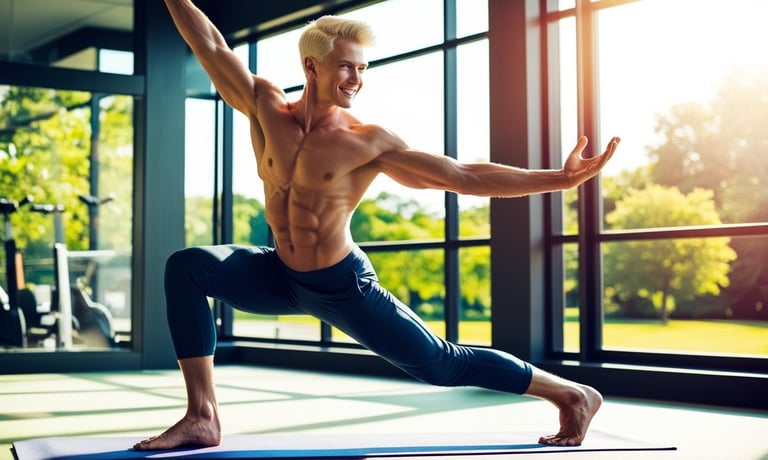Elevate Confidence with Expert-Backed Fitness Strategies
HEALTH & WELLNESS
By Sia Imime
4/27/20255 min read


Disclosure: This article contains affiliate links, meaning that if you purchase through them, I may earn a small commission at no extra cost to you. I only recommend products that I believe will add value to your personal growth journey.
Confidence isn’t something you're born with — it’s something you can build and nurture through consistent effort and practice. One powerful way to boost your self-esteem and feel more assured in your body is through fitness and movement. Physical activity has long been linked to improving not only your physical health but also your mental and emotional well-being. Whether you’re hitting the gym, practicing yoga, or simply going for a walk, movement has profound benefits for both your body and mind.
In this article, we’ll explore the science behind how fitness and movement can elevate your confidence. We’ll dive into insights from fitness experts, psychology, and body language research, giving you actionable strategies to integrate into your daily routine. Plus, we’ll recommend some products to help you along your fitness journey.
1. The Connection Between Fitness and Confidence: What the Science Says
Many studies have shown that physical activity has a direct link to mental health. According to the American Psychological Association, exercise boosts the production of endorphins, the "feel-good" hormones that can reduce stress and anxiety while enhancing mood. As a result, regular exercise often leads to a more positive self-image.
Research conducted by the University of British Columbia found that exercise, particularly aerobic activity, helps reduce depression and anxiety while improving cognitive function and overall well-being. This is because physical activity stimulates the release of neurotransmitters like serotonin and dopamine, which are essential for mood regulation.
Moreover, exercise helps you build a stronger, more resilient body, which directly impacts your confidence. The more you push your limits and see improvement in your physical capabilities, the more you'll develop an empowering sense of accomplishment and belief in your abilities.
2. Body Language and Confidence: How Movement Shapes How You Feel and Appear
Fitness and movement not only affect how you feel internally but also play a significant role in how others perceive you. According to body language experts, how you carry yourself communicates a great deal about your confidence.
When you engage in regular physical activity, your posture improves. Stronger core muscles, enhanced flexibility, and better overall body alignment help you stand taller, walk more gracefully, and move with intention. This shift in body posture can signal confidence, power, and assertiveness to those around you, even before you speak.
Research by Amy Cuddy, a social psychologist at Harvard University, shows that adopting "power poses" — standing or sitting in a posture that expresses confidence — can increase feelings of self-assurance and improve how others perceive you. When you engage in physical activities that emphasize posture and movement, such as yoga, Pilates, or strength training, you’re actively strengthening both your body and your self-confidence.
3. The Power of Setting Fitness Goals: How Achieving Milestones Boosts Your Self-Esteem
Setting and achieving goals in your fitness routine can be an incredibly effective way to boost your confidence. Psychology research reveals that goal-setting activates the brain's reward system, increasing feelings of satisfaction and reinforcing positive behavior.
A study published in Psychology of Sport and Exercise found that people who set specific, measurable fitness goals report greater satisfaction and increased motivation compared to those who have more general or undefined objectives. As you achieve these fitness milestones, you’ll begin to recognize your ability to set and accomplish goals in all areas of life — including your career, relationships, and personal development.
To enhance your confidence, consider setting small, achievable fitness goals (e.g., walking 10,000 steps a day or mastering a new exercise) and gradually progressing to more challenging targets. As you accomplish each one, celebrate your success and use it as fuel to tackle even bigger challenges.
4. Boosting Mental Resilience Through Fitness
Fitness can also help you build mental resilience — a key trait of highly confident individuals. According to Dr. Steve Peters, a leading psychologist and author of The Chimp Paradox, physical activity improves your brain’s ability to cope with stress, anxiety, and difficult situations.
When you work out, you’re training both your body and mind. Through exercise, you learn to push past discomfort, persist in the face of challenges, and embrace a growth mindset. Whether it’s running that extra mile, holding a challenging yoga pose, or lifting heavier weights, fitness teaches you to keep going when things get tough.
This mental toughness directly translates to higher confidence. The more you show yourself that you can endure physical challenges, the more you’ll believe you can handle life’s emotional, social, and professional hurdles with ease.
5. Fitness and Emotional Health: How Movement Impacts Your Mood
Regular physical activity has been proven to reduce symptoms of depression and anxiety. According to a study published in JAMA Psychiatry, exercise can have the same effect on mild to moderate depression as psychotherapy or medication. When you engage in fitness routines, your body’s production of serotonin and dopamine increases, which leads to improved mood and emotional well-being.
Feeling good in your own skin is a huge confidence booster. Exercise helps you feel more energized and capable, which directly affects how you view yourself. Even small, daily movements can lead to a noticeable improvement in your overall mood and outlook on life.
6. Social Connection Through Fitness: Building Friendships and Support Systems
Engaging in fitness activities like group classes, running clubs, or sports teams allows you to build meaningful relationships with others who share your passion. These connections can positively influence your confidence by providing emotional support, accountability, and a sense of belonging.
A study published in The Journal of Social and Clinical Psychology found that participating in group exercise sessions can increase feelings of social connectedness and reduce feelings of loneliness, which are often linked to lower self-esteem. Surrounding yourself with a supportive fitness community not only motivates you to keep moving but also enhances your sense of self-worth.
7. Expert-Backed Fitness Tips for Boosting Your Confidence
1. Incorporate Strength Training
Strength training is one of the most effective ways to boost confidence. It helps you build muscle, increase physical strength, and improve posture. Regular strength training also supports bone health and metabolism, giving you a stronger, more confident body.
2. Engage in Cardiovascular Exercise
Cardio exercises like running, cycling, and swimming improve endurance and heart health while boosting mood and reducing stress. Cardiovascular fitness can help you feel more energetic and capable, which positively impacts your confidence levels.
3. Practice Yoga or Pilates
These mind-body practices focus on flexibility, posture, and body awareness. Yoga and Pilates improve your mental clarity, reduce stress, and build a positive connection between your body and mind.
4. Set Realistic Fitness Goals
Start small and work your way up. Setting achievable goals and tracking your progress helps build momentum and reinforces a sense of accomplishment.
5. Stay Consistent
The key to boosting your confidence through fitness is consistency. Make physical activity a regular part of your routine, and over time, you’ll begin to notice improvements not only in your physical appearance but also in your self-esteem and overall outlook on life.
Recommended Products to Enhance Your Fitness Journey
To help you along the way, here are some Recommended products to elevate your fitness routine and boost your confidence:
Resistance Bands for Home Workouts
Fitness Tracker to Track Your Progress
Final Thoughts
Fitness and movement are not only key to physical health but also essential to building a confident, resilient, and empowered mindset. By incorporating regular exercise into your life, you can boost your confidence, improve your mental well-being, and develop the resilience needed to thrive in all aspects of life.
Remember, confidence is a journey — and every workout, every step, and every milestone brings you closer to becoming the strongest version of yourself. Start today and watch your confidence soar!
Tags: fitness and confidence, build self-esteem, mental health and exercise, movement for confidence, body language and posture, fitness mindset, goal setting in fitness, workout motivation, emotional resilience, exercise benefits
